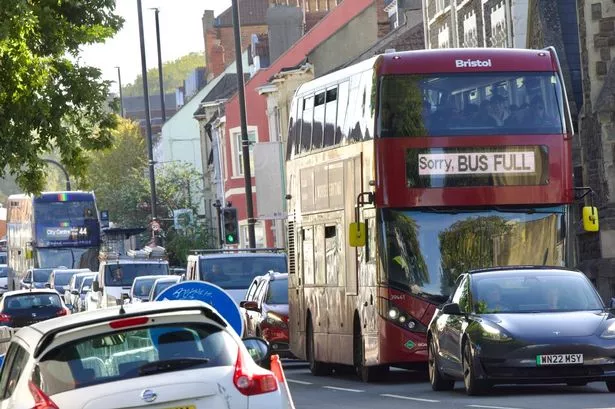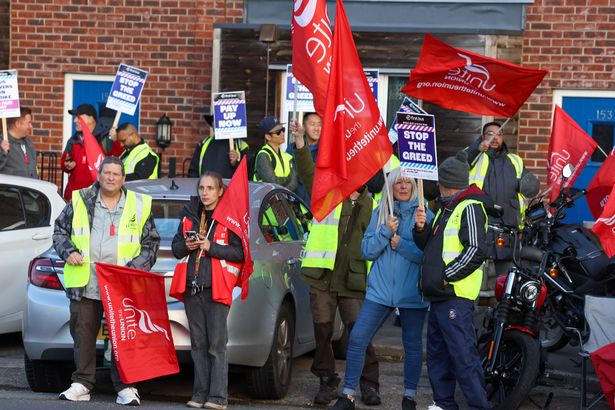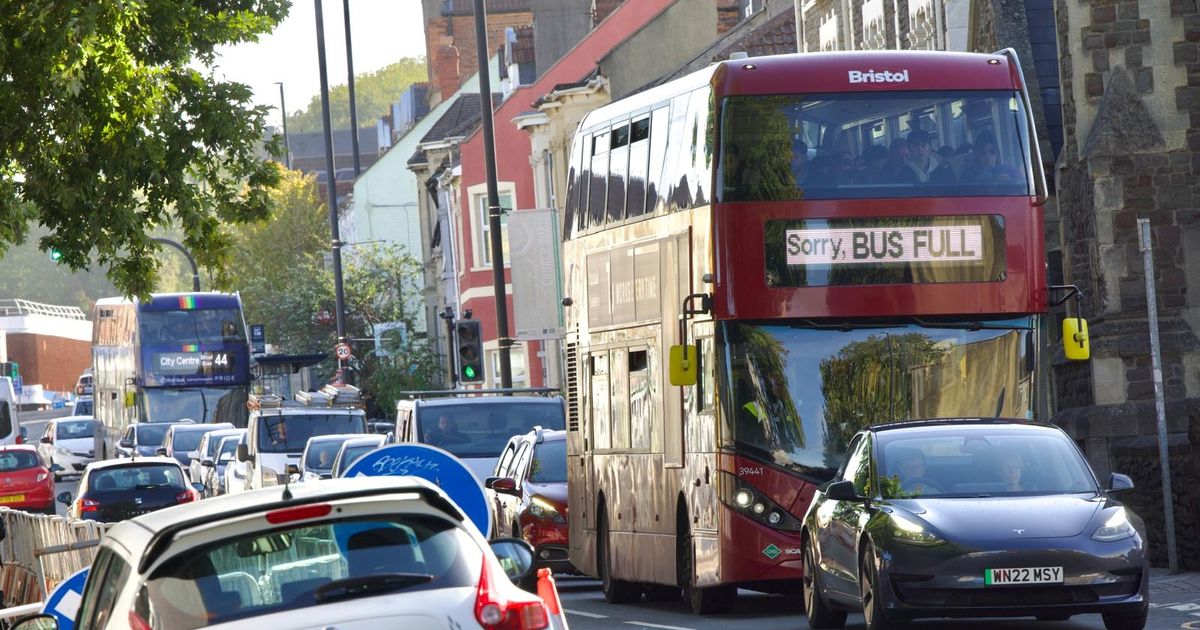There were long queues
14:22, 16 Sep 2025Updated 14:22, 16 Sep 2025
 A CityLines bus in East Bristol with a ‘bus full’ sign heads towards Bristol City Centre, on the first morning of a four-day bus strike, on Tuesday, September 16(Image: Paul Gillis/Bristol Post)
A CityLines bus in East Bristol with a ‘bus full’ sign heads towards Bristol City Centre, on the first morning of a four-day bus strike, on Tuesday, September 16(Image: Paul Gillis/Bristol Post)
Bristol’s traffic was brought to a standstill slightly more than it usually was on Tuesday morning, and tens of thousands of bus passengers were left walking, driving or working from home as the first day of a four-day bus strike hit Bristol.
Around 600 drivers based at two of the city’s three depots walked out and manned raucous picket lines at Lawrence Hill and Hengrove at the start of the first major bus strike in a generation in Bristol. First Bus scrapped CityLines 16 routes entirely, and cut back another 18 routes to one bus every half an hour or an hourly service, as managers estimated that between 70 per cent and 75 per cent of buses didn’t run at all.
The first day of the four-day dispute over a stepped pay increase saw huge delays on many of the main roads into Bristol – particularly on the A4 Portway, the A37 Wells Road, the A370 Brunel Way and the A420 Church Road from Kingswood into East Bristol. Passengers were left scratching their heads at bus stops as they found some services cancelled altogether, and bus services that were running scaled back to one bus every half an hour.
That meant many buses were already full as they approached inner city Bristol, but with Metrobus.
For the very latest updates on the Bristol Bus Strike, visit our updates blog here
“With the other depots at Marlborough Street and outside of Bristol all working, we estimate that we’ve got 60 per cent of the buses the West of England would normally have, out on the road this morning,” First’s managing director Doug Claringbold told Bristol Live. “At Hengrove and Lawrence Hill, we have somewhere between 25 per cent and 30 per cent of buses running, that’s drivers who want to accept the offer and are happy to work.
“I’m apologising to passengers, and I’m very frustrated for them. We’re doing everything we can to negotiate with Unite, which is very challenging,” he added. “We’re very happy to talk to Unite but people’s expectations about what this business can afford need to change.”
READ MORE: Bus strike in Bristol under way- LIVE updatesREAD MORE: How long the Bristol bus strike will last
At the picket line at Lawrence Hill, a steady and slow flow of drivers trundled past on Easton Road, but many beeped their horns in support of the striking drivers, who packed both sides of the road outside the bus depot.
Branch union convenor Nick Rawlings said he also regretted the impact on people in Bristol. “Of course we feel for the people that rely on our services to take them to work, people that do important jobs, nurses, doctors and teachers,” he said.
“But at the same time, there comes a point where you’ve got to do something to look after your own house. That’s what we’re trying to achieve. It’s really frustrating because we are that close.
“It’s an important job and we take it extremely seriously, and we don’t take this sort of action lightly. It’s a considered action. We took an industrial ballot a while ago, and suspended that action because of a secondary offer, and unfortunately that was rejected, rightly or wrongly, and we’re now moving on from that,” he added.
“We’re almost there, but not quite. We absolutely hope that we won’t have to do four days. We believe that tomorrow or Thursday that senior management will call me and my colleagues back in and we’ll hopefully come to a satisfactory conclusion to this,” he added.
 FIRST Bus drivers picket outside Lawrence Hill Depot in Bristol this morming, Tuesday 16 September 2025, on a proposed four day strike.(Image: PAUL GILLIS / Reach PLC)
FIRST Bus drivers picket outside Lawrence Hill Depot in Bristol this morming, Tuesday 16 September 2025, on a proposed four day strike.(Image: PAUL GILLIS / Reach PLC)
The strike has been called by the union after 600 members at the two affected depots rejected – twice – the finer details of a pay offer from First’s management. On both occasions the union reps who negotiated the deal then put it forward to their members with a recommendation that it be accepted, but both times a majority of the drivers at the two depots voted to reject it – and that meant a strike for all union drivers.
The point of dispute is not about how much of a pay rise over two years the drivers should receive, but the way in which it will be implemented.
First and Unite have agreed that drivers should see their basic pay of £16 an hour rise to £17 an hour by April, and on to £17.40 the following year. That is an increase of 4.7 per cent this year and another 4 per cent next year. But the disagreement is over the speed of those increases, with drivers wanting the bulk of the increase loaded into this year – and therefore backdated to April – and First wanting to spread out the pay rise over the two years with a stepped rise this year to £16.50 and then £17 an hour in stages.
For a full list of the affected services, whether they are running or not and how often, visit our dedicated list here
For an explainer on the build up to the bus strike, visit here
